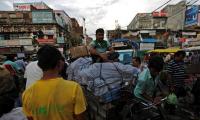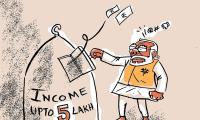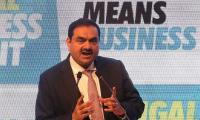Domestic Saving to Remain Top Lender in India: RBI
RBI Deputy Governor Michael Patra says domestic saving will continue to be the primary source of financing for India's economy in the coming decades, driven by rising incomes and household wealth.
Mumbai, Sep 3 (PTI) Reserve Bank Deputy Governor Michael Debabrata Patra on Tuesday said domestic saving has largely financed the investment needs of the economy and will remain the top net lender in coming decades.
In a keynote address at the Financing 3.0 Summit: Preparing for Viksit Bharat organised by the Confederation of Indian Industries (CII) here, the deputy governor said that recently, the net financial savings of households has almost halved from 2020-21 levels due to behavioural changes in the form of unwinding of prudential savings accumulated during the pandemic and shifting from financial assets to physical assets like housing.
"Going forward, boosted by rising incomes, households will likely build back their financial assets...This process has already begun. Households' financial assets have increased from 10.6 per cent of GDP during 2011-17 to 11.5 per cent during 2017-23 (excluding the pandemic year)," Patra said.
Their physical savings have also risen in the post-pandemic years to over 12 per cent of GDP and could rise further, he said, adding they had reached 16 per cent of GDP in 2010-11.
"Accordingly, households will remain the top net lenders to the rest of the economy in the coming decades," the senior RBI official said.
He further said the private corporate sector has drastically reduced its net borrowings from the rest of the economy, reflecting a combination of rising internal accruals and subdued capacity creation.
Looking ahead, Patra said its net borrowing requirement is likely to rise on the back of a revival in the capex cycle.
"These financing requirements will largely be met by households and external resources," he noted.
The deputy governor said that net dis-saving of the public sector has been moderating, albeit unevenly. This sector will remain a net borrower in the economy, given the critical role envisaged for fiscal policy in shaping India's future.
If the nation, as a whole, has a deficit, it borrows from the rest of the world and the inflow of foreign savings helps finance its investment needs, he added.
For India, domestic savings have largely financed the overall investment requirements of growth, with external financing playing a supplemental role as reflected in overall modest current account deficits.
"As the productive capacity of the economy rises and its ability to absorb foreign resources expands, the volume of external financing and its composition may undergo fundamental shifts, but in the light of past experiences, external debt sustainability will remain a policy priority," Patra said.
During his address, Patra also delved into India's growth story and the fact that the country is riding on the cusp of a distinct demographic advantage.
He said a productive workforce is critical for value creation in an economy, while capital would play an important supportive role.
CII Director General Chandrajit Banerjee, in his welcome address, lauded the performance of India's external sector and underscored the role of the RBI in ensuring that its financing is stable, sustainable, and aligned with the country's economic policies.
He said greater investment can be useful to garner more financing in physical infrastructure, components for the digital economy, as well as emerging sectors like renewable energy, warehousing, semiconductor ecosystem, and data centres.
In a keynote address at the Financing 3.0 Summit: Preparing for Viksit Bharat organised by the Confederation of Indian Industries (CII) here, the deputy governor said that recently, the net financial savings of households has almost halved from 2020-21 levels due to behavioural changes in the form of unwinding of prudential savings accumulated during the pandemic and shifting from financial assets to physical assets like housing.
"Going forward, boosted by rising incomes, households will likely build back their financial assets...This process has already begun. Households' financial assets have increased from 10.6 per cent of GDP during 2011-17 to 11.5 per cent during 2017-23 (excluding the pandemic year)," Patra said.
Their physical savings have also risen in the post-pandemic years to over 12 per cent of GDP and could rise further, he said, adding they had reached 16 per cent of GDP in 2010-11.
"Accordingly, households will remain the top net lenders to the rest of the economy in the coming decades," the senior RBI official said.
He further said the private corporate sector has drastically reduced its net borrowings from the rest of the economy, reflecting a combination of rising internal accruals and subdued capacity creation.
Looking ahead, Patra said its net borrowing requirement is likely to rise on the back of a revival in the capex cycle.
"These financing requirements will largely be met by households and external resources," he noted.
The deputy governor said that net dis-saving of the public sector has been moderating, albeit unevenly. This sector will remain a net borrower in the economy, given the critical role envisaged for fiscal policy in shaping India's future.
If the nation, as a whole, has a deficit, it borrows from the rest of the world and the inflow of foreign savings helps finance its investment needs, he added.
For India, domestic savings have largely financed the overall investment requirements of growth, with external financing playing a supplemental role as reflected in overall modest current account deficits.
"As the productive capacity of the economy rises and its ability to absorb foreign resources expands, the volume of external financing and its composition may undergo fundamental shifts, but in the light of past experiences, external debt sustainability will remain a policy priority," Patra said.
During his address, Patra also delved into India's growth story and the fact that the country is riding on the cusp of a distinct demographic advantage.
He said a productive workforce is critical for value creation in an economy, while capital would play an important supportive role.
CII Director General Chandrajit Banerjee, in his welcome address, lauded the performance of India's external sector and underscored the role of the RBI in ensuring that its financing is stable, sustainable, and aligned with the country's economic policies.
He said greater investment can be useful to garner more financing in physical infrastructure, components for the digital economy, as well as emerging sectors like renewable energy, warehousing, semiconductor ecosystem, and data centres.
You May Like To Read
TODAY'S MOST TRADED COMPANIES
- Company Name
- Price
- Volume
- Vodafone-Idea-L
- 11.65 (+ 3.56)
- 106772451
- Alstone-Textiles
- 0.28 ( -3.45)
- 44187760
- Mangalam-Industrial
- 0.88 ( -2.22)
- 39177573
- Sunshine-Capital
- 0.27 (+ 3.85)
- 35956340
- GMR-Airports
- 104.40 (+ 6.37)
- 30453005






